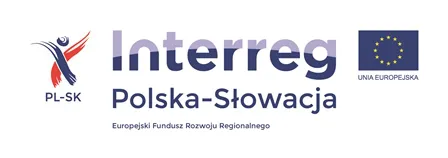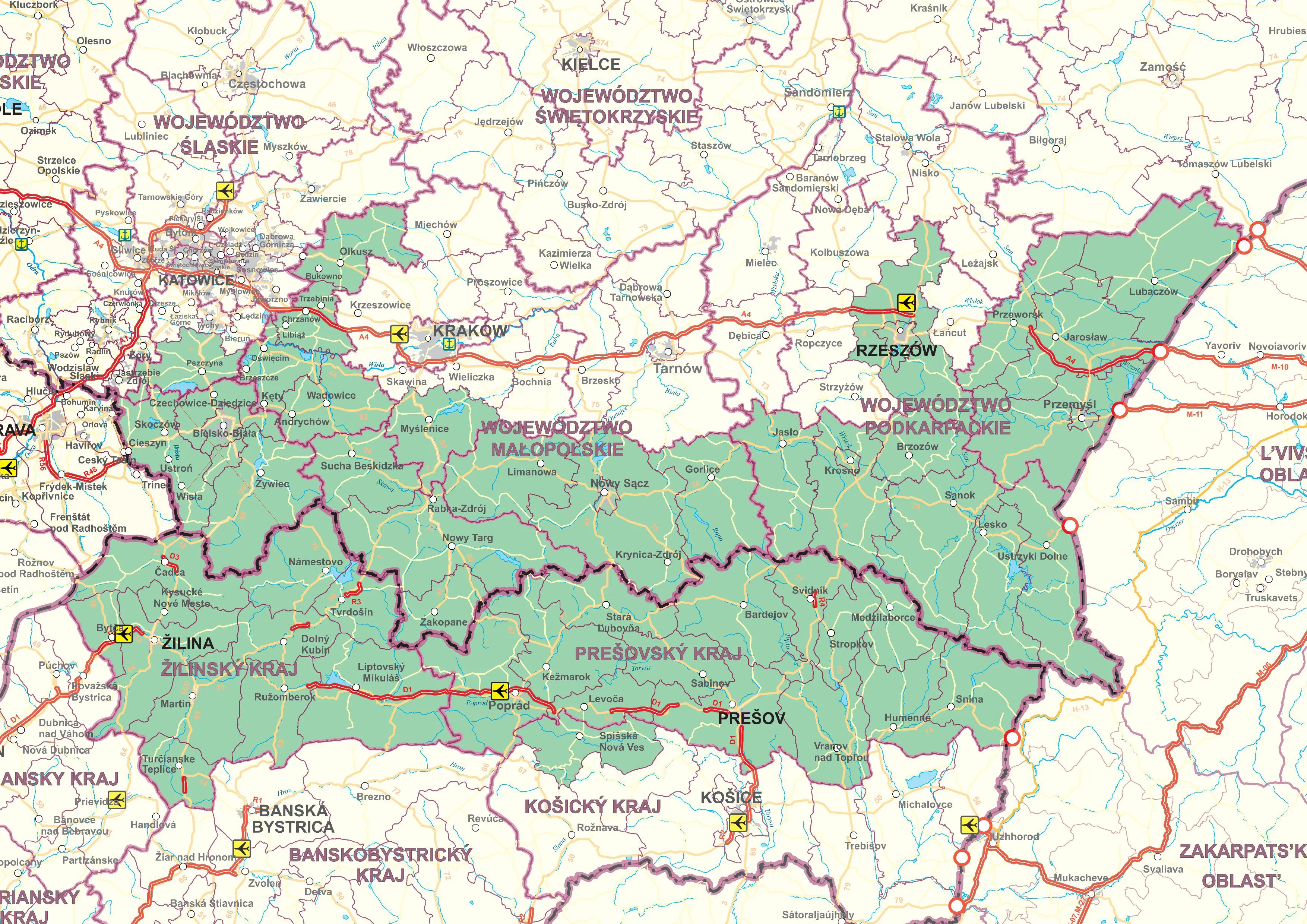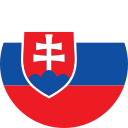
About program

The Interreg VA Poland-Slovakia 2014-2020 program was prepared by an international working group working in the years 2012-2015. The draft program document was also the subject of public consultations. The European Commission approved the Interreg VA Polska-Slovakia 2014-2020 Program on February 12, 2015. It is the first cross-border cooperation program planned to be implemented on Polish borders in 2014-2020, which has been approved by Brussels. Almost EUR 155 million from the European Regional Development Fund will be allocated to the implementation of the projects.
In the 2014-2020 financial perspective, micro-projects in the Carpathian Euroregion will be implemented under two umbrella projects implemented in axis 1 and 3:
Axis 1 "Implementation of micro-projects in the field of protection and development of natural and cultural heritage in the Carpathian Euroregion and WJT in Prešov"
Leading Partner : Association of the Carpathian Euroregion Poland
Project Partner : Prešov Self-Government Country
Project number : PLSK.01.01.00-18-0001 / 16
Implementation period : 01/10/2015 - 30/06/2022
Total project value : EUR 6 275 399.15
Axis 3 "Implementation of microprojects in the field of education in the Carpathian Euroregion and WJT in Prešov"
Leading Partner : Association of the Carpathian Euroregion Poland
Project Partner : Prešov Self-Government Country
Project number : PLSK.03.01.00-18-0002 / 16
Project implementation period : 01/10/2015 - 31/12/2018
Total project value : EUR 697 266.57
Compared to previous years, the Program in the 2014-2020 financial perspective is distinguished by a significant thematic concentration and the principle of being results-oriented. For the Beneficiaries, this means a narrower and more precisely described scope of activities that can be co-financed and greater responsibility in relation to product indicators that are to be the result of implemented projects.
The program responds to the key challenges of the Polish-Slovak borderland and will support projects in the field of protection and promotion of natural and cultural heritage, development of transport and improvement of the quality of education. Most, as much as half of the program funds (ie approximately EUR 77.5 million), will be invested in the protection, promotion and development of environmental resources and cultural heritage. The amount of almost EUR 56 million will support the development of road infrastructure that will improve communication between Poland and Slovakia and improve connections with the Trans-European Transport Network. In the field of education, joint cross-border vocational training projects will be co-financed, aimed at adapting vocational education to the requirements of the cross-border labor market and to the expectations of employers operating in the area covered by the program support. EUR 12 million will be allocated for this purpose.
Program budget
EUR 155 million from the European Regional Development Fund. Most, as much as half of the program funds (ie approximately EUR 77.5 million), will be invested in the protection, promotion and development of environmental resources and cultural heritage. The amount of almost EUR 56 million will support the development of road infrastructure that will improve communication between Poland and Slovakia and improve connections with the Trans-European Transport Network. In the field of education, joint cross-border vocational training projects will be co-financed, aimed at adapting vocational education to the requirements of the cross-border labor market and to the expectations of employers operating in the area covered by the program support. EUR 12 million will be allocated for this purpose.

Support area
Poland (poviats) : Pszczyna, Cieszyn, Bielski, city with poviat rights Bielsko-Biała, Żywiec, Olkusz, Chrzanów, Oświęcim, Wadowicki, Suski, Myślenicki, Tatra, Nowy Sącz, Limanowski, Nowosądecki, a city with poviat rights Nowy Sącz, Gorlicki, Bieszczady, Leski, Sanok, Brzozowski, Krośnieński, city with county rights Krosno, Jasielski, Rzeszów, city with county rights Rzeszów, Przeworski, Przemyśl, a city with county rights: Przemyśl, Jarosławski, Lubaczowski.
Slovakia (districts) : Čadca, Kysucké Nové Mesto, Bytča, Žilina, Martin, Turčianske Teplice, Ružomberok, Dolný Kubín, Námestovo, Tvrdošín, Liptovský Mikuláš, Spišská Nová Ves, Poprad, Sžmarov, Starová, Levočuba, Starová, Levoškáš, , Prešov, Vranov nad Topľou, Stropkov, Medzilaborce, Humenné, Snina.
Program Managing Authority
The Managing Authority within the structure of the Ministry of Development is responsible for the management of the Interreg Polska-Slovakia program. Responsible, inter alia, for the development of program documents and their updating, conducting evaluation, signing co-financing agreements and annexes to these agreements with beneficiaries, examining complaints / objections regarding the implementation of the co-financing agreement, making payments to the beneficiary. The Managing Authority is also the Certifying Authority. The detailed scope of tasks and competences of the Managing Authority is included in the programming document approved by the European Commission.
National Institution
The role of the National Authority in the program is performed by the Ministry of Agriculture and Rural Development of the Slovak Republic. The tasks of the National Authority include, among others: ensuring national funding from the state budget of the Slovak Republic (in accordance with the provisions of Slovak law), confirming, at the request of the Managing Authority, the eligibility of partners under the national law, first level control on the Slovak side (project control and expenditure control technical assistance for Slovak contact points and the Group of Auditors).
Audit Authority
The body acting as the Audit Institution (AA) is the General Inspector of Fiscal Control (GIKS) at the Ministry of Finance of the Republic of Poland. The Audit Authority will be supported by a Group of Auditors made up of representatives of each of the participating countries. The Audit Authority is responsible for audits of EU funds spending.
First Degree Control
Before the lead partner sends the payment claim for the project to the JTS, the expenditure incurred in the project by the individual partners (including the lead partner) is verified and confirmed by independent national controllers appointed by the Member States in accordance with Art. 23 sec. 4 of the ETC Regulation. The controllers' task is to confirm the delivery of products and services, the eligibility of the declared expenses and their compliance with the rules of the program, EU law and national law, as well as confirming the correct implementation of the project in accordance with the assumptions in the application for co-financing.
Both Poland and Slovakia have a centralized control system, i.e. public authorities or institutions of the central level have been appointed and entrusted with the performance of control tasks.
In Poland, the functions of controllers are performed by: the Voivode of Małopolska, the Voivode of Podkarpacie and the Voivode of Silesia. As a rule, the controller checks those partners who have their seat in the voivodship competent for the Voivode acting as the controller.
In Slovakia, the controller is the Department of Cross-Border Cooperation Programs of the Ministry of Agriculture and Rural Development of the Slovak Republic.
Monitoring Committee
The main tasks of the Monitoring Committee include, among others: approval of program documents and project selection criteria, selection of projects for co-financing, consideration of complaints regarding project selection, monitoring of the implementation progress of the Program and its priority axes, in accordance with Art. 49 sec. 1 of Regulation (EU) No 1303/2013, approving annual and final reports on the implementation of the Program. More information on the Monitoring Committee can be found in the Monitoring Committee tab .
Joint Technical Secretariat
The Joint Technical Secretariat shall assist the Managing Authority and the Monitoring Committee in carrying out their functions. It also provides potential beneficiaries with information on funding opportunities under the program and supports beneficiaries in implementing projects. If you want to contact the Joint Technical Secretariat, contact details can be found in the Contact tab.
Regional Contact Points
Regional Contact Points inform potential applicants about the Program and conduct consultations for applicants, as well as cooperate in the implementation of the Program Communication Strategy. Regional Contact Points are located in the Marshal's Offices of the following voivodeships: Śląskie, Małopolskie and Podkarpackie - on the Polish side, and in the Higher Territorial Units of Prešov and Žilina on the Slovak side. Contact details for Regional Contact Points can be found in the Find an Information Point tab.
Euroregions and Higher Territorial Units
Euroregions operating in the Polish-Slovak border area, ie Euroregion Beskidy, Euroregion Carpathian, and Euroregion Tatry, and on the Slovak side Higher Territorial Units in Žilina and Prešov are responsible for the implementation of micro-projects by implementing umbrella projects. Contact details of Umbrella Project Partners can be found in the Find an Information Desk tab.
What can be done under the Program?
Basic information
The program grants co-financing only to projects that meet its objectives (Program objectives), implemented in the Program support area (Program support area map), i.e. in specific border regions on both sides of the Polish-Slovak border or having a significant impact on the support area on both sides border. The following types of projects will be supported:
- standard projects - selected in a competition called the call for proposals;
- flagship projects - selected through a two-stage competition, consisting of recruitment for concepts of flagship projects, and then recruitment for full design applications, in which only approved concepts of flagship projects participate;
- microprojects that receive co-financing in the framework of calls for proposals carried out by euroregions in Poland (Tatra Mountains, Beskidy Mountains, Carpathians) and Higher Territorial Units in Slovakia (Prešov, Žilina); calls for micro-projects are carried out as part of the implementation of the so-called umbrella project.
The Program will support projects of key importance for the development of the Polish-Slovak borderland. Compared to previous years, the Program in the 2014-2020 financial perspective is distinguished by a significant thematic concentration and the principle of being results-oriented. For the beneficiaries, this means a narrower and more precisely described scope of activities that can be co-financed and greater responsibility in relation to the output indicators that are to be the result of implemented projects.
Types of supported undertakings
A significant part of the funds of the Interreg VA Polska Slovakia 2014-2020 Program will be allocated to investment projects - aimed at the protection and development of the natural and cultural heritage of the border area and ensuring sustainable transport. Initiatives in the development of cross-border education and lifelong learning can also count on support. Various types of cross-border activities can receive funding.






